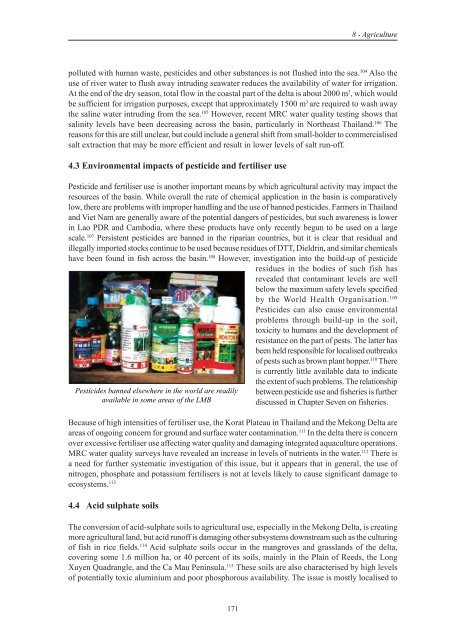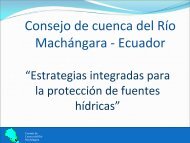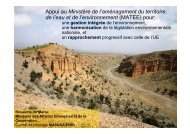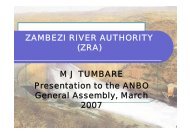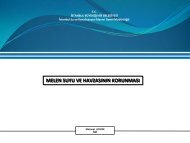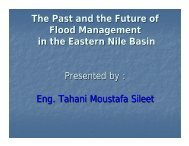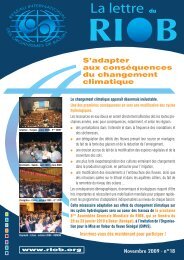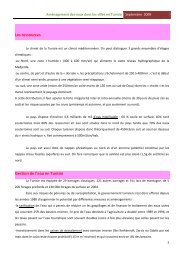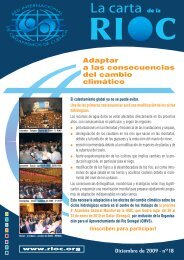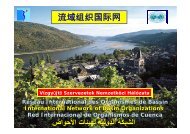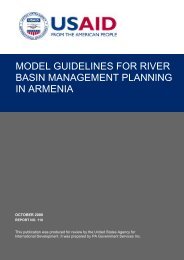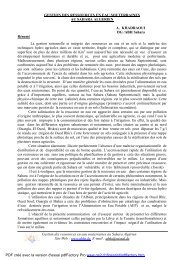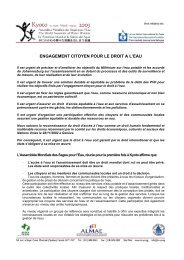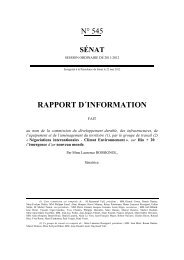- Page 1 and 2:
Mekong River CommissionState of the
- Page 3 and 4:
Published in Phnom Penh in June 200
- Page 5 and 6:
6. Macroeconomic trends in the Lowe
- Page 7 and 8:
4. Data on water and sanitation in
- Page 9 and 10:
Table 12. Net secondary enrolment (
- Page 11 and 12:
11. Trade and transport ...........
- Page 13 and 14:
The governments in the LMB have rec
- Page 15 and 16:
xiv
- Page 17 and 18:
MMRMRBMRCMWNERNMCNSRNTFPPPPPRCRGCSO
- Page 19 and 20:
State of the Basin Report - 2003tow
- Page 21 and 22:
State of the Basin Report - 2003inc
- Page 23 and 24:
2 - Physical landforms of the Mekon
- Page 25 and 26:
2 - Physical landforms of the Mekon
- Page 27 and 28:
2 - Physical landforms of the Mekon
- Page 29 and 30:
3 - Water in the Mekong BasinWater
- Page 31 and 32:
3 - Water in the Mekong BasinRainfa
- Page 33 and 34:
3 - Water in the Mekong BasinTwo ot
- Page 35 and 36:
3 - Water in the Mekong BasinThe fo
- Page 37 and 38:
3 - Water in the Mekong BasinFigure
- Page 39 and 40:
3 - Water in the Mekong Basin4. Wat
- Page 41 and 42:
Figure 11 (a): Total suspended soli
- Page 43 and 44:
3 - Water in the Mekong BasinConcer
- Page 45 and 46:
4 - Biota of the Mekong BasinBiota
- Page 47 and 48:
4 - Biota of the Mekong BasinA numb
- Page 49 and 50:
4 - Biota of the Mekong Basinof the
- Page 51 and 52:
4 - Biota of the Mekong BasinLiver
- Page 53 and 54:
4 - Biota of the Mekong BasinRefere
- Page 55 and 56:
5 - Peoples of the MekongPeoples of
- Page 57 and 58:
5 - Peoples of the MekongRural and
- Page 59 and 60:
5 - Peoples of the Mekong1.2 Ethnic
- Page 61 and 62:
5 - Peoples of the MekongIn the Cen
- Page 63 and 64:
5 - Peoples of the MekongThe search
- Page 65 and 66:
5 - Peoples of the Mekong2.1 Indice
- Page 67:
5 - Peoples of the MekongHealth-adj
- Page 70 and 71:
State of the Basin Report - 2003The
- Page 72 and 73:
State of the Basin Report - 2003In
- Page 74 and 75:
State of the Basin Report - 2003Tab
- Page 76 and 77:
State of the Basin Report - 2003The
- Page 78 and 79:
State of the Basin Report - 2003Acr
- Page 80 and 81:
State of the Basin Report - 2003Som
- Page 82 and 83:
State of the Basin Report - 2003oth
- Page 84 and 85:
State of the Basin Report - 2003The
- Page 86 and 87:
State of the Basin Report - 2003of
- Page 88 and 89:
State of the Basin Report - 2003Eco
- Page 90 and 91:
State of the Basin Report - 2003End
- Page 92 and 93:
State of the Basin Report - 200395W
- Page 95 and 96:
5 - Peoples of the MekongDennis, J.
- Page 97 and 98:
5 - Peoples of the MekongNESDB. 200
- Page 99 and 100:
5 - Peoples of the MekongWorld Bank
- Page 101 and 102:
6 - Macroeconomic trends in the Low
- Page 103 and 104:
6 - Macroeconomic trends in the Low
- Page 105 and 106:
6 - Macroeconomic trends in the Low
- Page 107 and 108:
6 - Macroeconomic trends in the Low
- Page 109 and 110:
6 - Macroeconomic trends in the Low
- Page 111 and 112:
6 - Macroeconomic trends in the Low
- Page 113 and 114:
6 - Macroeconomic trends in the Low
- Page 115 and 116:
6 - Macroeconomic trends in the Low
- Page 117 and 118:
7 - FisheriesFisheries 7The Mekong
- Page 119 and 120:
7 - FisheriesTonle SapThe Tonle Sap
- Page 121 and 122:
7 - Fisheries2. Capture fisheries2.
- Page 123 and 124:
7 - FisheriesThe surveys found that
- Page 125 and 126:
7 - Fisheriesfisheries, the conserv
- Page 127 and 128:
○ ○ ○ ○ ○ ○ ○ ○ ○
- Page 129 and 130:
7 - FisheriesTable 4.Indigenous fis
- Page 131 and 132:
7 - FisheriesThe conversion of floo
- Page 133 and 134:
7 - FisheriesEven though the total
- Page 135 and 136: 7 - FisheriesFertiliser run-off int
- Page 137 and 138: 7 - FisheriesTable 5. Freshwater aq
- Page 139: 7 - Fisheriesculture, rice-fish and
- Page 142 and 143: State of the Basin Report - 20034.
- Page 144 and 145: State of the Basin Report - 20034.1
- Page 146 and 147: State of the Basin Report - 2003Wat
- Page 148 and 149: State of the Basin Report - 2003The
- Page 150 and 151: State of the Basin Report - 200349V
- Page 152 and 153: State of the Basin Report - 2003150
- Page 154 and 155: State of the Basin Report - 2003Cla
- Page 156 and 157: State of the Basin Report - 2003Mat
- Page 158 and 159: State of the Basin Report - 2003Sve
- Page 160 and 161: State of the Basin Report - 2003144
- Page 162 and 163: State of the Basin Report - 20031.
- Page 164 and 165: State of the Basin Report - 20032.
- Page 166 and 167: State of the Basin Report - 2003In
- Page 168 and 169: State of the Basin Report - 2003glo
- Page 170 and 171: State of the Basin Report - 2003Irr
- Page 172 and 173: State of the Basin Report - 2003app
- Page 174 and 175: State of the Basin Report - 2003Tab
- Page 176 and 177: State of the Basin Report - 2003In
- Page 178 and 179: State of the Basin Report - 2003Tab
- Page 180 and 181: State of the Basin Report - 2003Tab
- Page 182 and 183: State of the Basin Report - 2003The
- Page 184 and 185: State of the Basin Report - 2003var
- Page 188 and 189: State of the Basin Report - 2003the
- Page 190 and 191: State of the Basin Report - 2003Vie
- Page 192 and 193: State of the Basin Report - 2003and
- Page 194 and 195: State of the Basin Report - 2003End
- Page 196 and 197: State of the Basin Report - 2003100
- Page 198 and 199: State of the Basin Report - 2003FCM
- Page 200 and 201: State of the Basin Report - 2003UND
- Page 202 and 203: State of the Basin Report - 2003Unl
- Page 204 and 205: State of the Basin Report - 2003Tab
- Page 206 and 207: State of the Basin Report - 2003as
- Page 208 and 209: State of the Basin Report - 2003Def
- Page 210 and 211: State of the Basin Report - 2003As
- Page 212 and 213: State of the Basin Report - 20032.2
- Page 214 and 215: State of the Basin Report - 20033.
- Page 216 and 217: State of the Basin Report - 2003•
- Page 218 and 219: State of the Basin Report - 2003Ref
- Page 220 and 221: State of the Basin Report - 2003Nor
- Page 222 and 223: State of the Basin Report - 2003The
- Page 224 and 225: State of the Basin Report - 2003Fig
- Page 226 and 227: State of the Basin Report - 2003The
- Page 228 and 229: State of the Basin Report - 2003res
- Page 230 and 231: State of the Basin Report - 2003Tab
- Page 232 and 233: State of the Basin Report - 20036.
- Page 234 and 235: State of the Basin Report - 2003The
- Page 236 and 237:
State of the Basin Report - 2003Of
- Page 238 and 239:
State of the Basin Report - 20033.
- Page 240:
State of the Basin Report - 2003In
- Page 243 and 244:
11 - Trade and transportFigure 6. V
- Page 245 and 246:
11 - Trade and transport6. Growth a
- Page 247 and 248:
11 - Trade and transport7. IWT traf
- Page 249 and 250:
11 - Trade and transportTable 1 : T
- Page 251 and 252:
11 - Trade and transportTable 2:Fiv
- Page 253 and 254:
11 - Trade and transport• The Mek
- Page 255 and 256:
11 - Trade and transportFigure 8: C
- Page 257 and 258:
11 - Trade and transport12.2 Some e
- Page 259 and 260:
12 - Domestic water and sanitationD
- Page 261 and 262:
12 - Domestic water and sanitationT
- Page 263 and 264:
12 - Domestic water and sanitationA
- Page 265 and 266:
12 - Domestic water and sanitationa
- Page 267 and 268:
12 - Domestic water and sanitationf
- Page 269 and 270:
12 - Domestic water and sanitationt
- Page 271 and 272:
12 - Domestic water and sanitationT
- Page 273 and 274:
12 - Domestic water and sanitation4
- Page 275 and 276:
12 - Domestic water and sanitationI
- Page 277 and 278:
12 - Domestic water and sanitationI
- Page 279 and 280:
12 - Domestic water and sanitationn
- Page 281 and 282:
12 - Domestic water and sanitationR
- Page 283 and 284:
12 - Domestic water and sanitationU
- Page 285 and 286:
13 - Flood in the Lower Mekong basi
- Page 287 and 288:
13 - Flood in the Lower Mekong basi
- Page 289 and 290:
13 - Flood in the Lower Mekong basi
- Page 291 and 292:
13 - Flood in the Lower Mekong basi
- Page 293 and 294:
13 - Flood in the Lower Mekong basi
- Page 295 and 296:
Figure 3. Satellite images of the T
- Page 297 and 298:
13 - Flood in the Lower Mekong basi
- Page 299 and 300:
14 - Cooperation in the Mekong Basi
- Page 301 and 302:
14 - Cooperation in the Mekong Basi
- Page 303 and 304:
14 - Cooperation in the Mekong Basi
- Page 305 and 306:
14 - Cooperation in the Mekong Basi
- Page 307 and 308:
14 - Cooperation in the Mekong Basi
- Page 309 and 310:
14 - Cooperation in the Mekong Basi
- Page 311 and 312:
14 - Cooperation in the Mekong Basi
- Page 313 and 314:
14 - Cooperation in the Mekong Basi
- Page 315 and 316:
14 - Cooperation in the Mekong Basi


